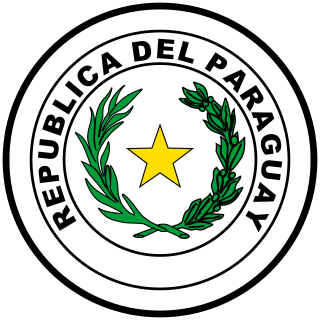Top Qs
Timeline
Chat
Perspective
Politics of Paraguay
From Wikipedia, the free encyclopedia
Remove ads
Politics of Paraguay takes place in a framework of a presidential representative democratic republic. The National Constitution mandates a separation of powers in three branches. Executive power is exercised solely by the President. Legislative power is vested in the two chambers of the National Congress. The Judiciary power is vested on Tribunals and Courts of Civil Law and a nine-member Supreme Court of Justice, all of them independent of the executive and the legislature.
This article needs additional citations for verification. (February 2018) |
Historically, Paraguay has been characterized by civil wars, coups and authoritarianism.[1] Paraguay was for several decades under dictatorial rule by Alfredo Stroessner and his Colorado Party until he was ousted from power in 1989, which set off a democratization process.[2][3]
Since 1989, there has been an expansion of civil and political liberties, as well as elections at presidential, congressional, and municipal levels.[2] However, the democratization process has been limited due to the firm control of the Colorado Party on the Paraguay state.[3] The Colorado Party retains power through clientelistic practices.[3] Corruption is widespread in Paraguay.[3] The Economist Intelligence Unit rated Paraguay a "flawed democracy" in 2023.[4] After having been rated a "flawed democracy" for 1 year, the Economist Intelligence Unit (EIU) returned Paraguay's rating to "hybrid regime" in 2024.[5]
Remove ads
Executive branch
Summarize
Perspective

The president, popularly elected for one 5-year term with no chance of re-elections, appoints a cabinet. The president nominates the Council of Ministers. The presidential elections of 2008 were won by Fernando Lugo, a Roman Catholic bishop whose ministerial duties have been suspended on his request by the Holy See. It was the first time in 61 years that the Colorado Party lost a presidential election in Paraguay, and only a second time that a leftist served as president after 1936–37, and the first time one was ever freely elected. In 2013, Lugo was removed from office through the process of impeachment. This action was widely hailed as a coup d'état by heads of state throughout Latin America,[6][7] with leaders from nations such as Argentina and Ecuador announcing they would refuse to recognize his successor as the legitimate President of Paraguay.[8]
In May 2023, Santiago Peña of the long-ruling Colorado Party, won the presidential election to succeed Mario Abdo as the next President of Paraguay.[9] On 15 August 2023, Santiago Peña was sworn in as Paraguay's new president.[10]
The workplace of the President of Paraguay is the Palacio de los López, in Asunción. The Presidential Residence is Mburuvichá Roga, also in Asunción. Once presidents leave office, they are granted by the Constitution the speaking-but-non-voting position of Senator for life.
Office of the First Lady
In Paraguay, the post of the First Lady of Paraguay is official.[citation needed]
Remove ads
Legislative branch

The National Congress (Congreso Nacional) has two chambers. The Chamber of Deputies (Cámara de Diputados) has 80 members, elected for a five-year term by proportional representation. The Chamber of Senators (Cámara de Senadores) has 45 members, elected for a five-year term by proportional representation.
Political parties and elections
Latest elections
President
Senate
Chamber of Deputies
Remove ads
Judicial branch

Paraguay's highest court is the Supreme Court of Paraguay.
Administrative divisions
The Constitution of Paraguay states "The law will regulate the various areas in which these officials and employees can provide their services, including the judicial, the diplomatic and consular professions, the areas of scientific and technological research, civil services, military and police. This will not preclude others. " Each of Paraguay's 17 departments is headed by a popularly elected governor. Paraguay is divided in 17 departments (departamentos, singular – departamento) and one capital city; Alto Paraguay, Alto Paraná, Amambay, Asunción (city), Boquerón, Caaguazú, Caazapá, Canindeyú, Concepción, Cordillera, Guairá, Itapúa, Ñeembucú, Paraguarí, Presidente Hayes, San Pedro.
Remove ads
See also
References
External links
Wikiwand - on
Seamless Wikipedia browsing. On steroids.
Remove ads


